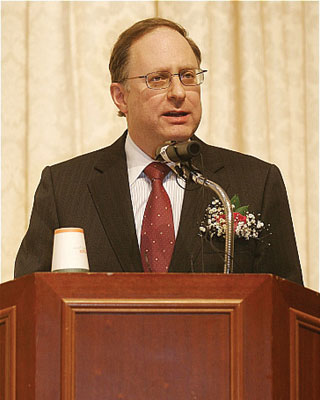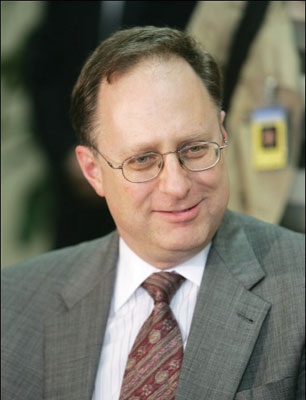
The United States Embassy in Korea held a seminar at the Incheon Hyatt Regency on March 16, 2007 to promote understanding with the country's university-press. YNO, together with 25 other press-groups attended the event and had candid, in-depth conversations on various topics with Ambassador Alexander Vershbow and his diplomatic colleagues.
Alexander Vershbow was sworn in as Ambassador to the Republic of Korea on October 14, 2005 and took up his duties on October 17, 2005. He is a career-member of the Foreign Service, with the rank of Career-Minister, and has extensive experience in East-West relations, non-proliferation, and European security affairs.
| Dong-Woo Seo _ seoproducer@ynu.ac.kr |
FTA
The University Press: This FTA didn't open the door to the field of education completely. Do you think that this field will have to open more in the future?
The Ambassador: The educational market in Korea wasn't opened completely in the FTA between Korea and the United States. The US didn't force Korea to open its educational market because it has been of little importance to the US. It's interesting that Koreans are anxious about it. Universities in Korea persevere in their efforts to strengthen competitiveness without opening the educational market. They actively study the graduate-schools of other countries, but the opening of education will do more to improve competitive power.

The Movie-Industry
The University Press: It is a fact that Hollywood is suppressing Korean movies by operating a screen quota. The US can expect to maximize profits from the industry, but other countries are in crisis and are about to lose their artistic identities. What do you think about this?
Ambassador: It is rare for a country to have a screen quota. Korean movies have developed at a fast rate and are now very competitive. In a previous FTAs the Korean Government strove for a reduction of the screen quota.
Recently, 'Spiderman-3' swept the market, but comparatively few people know that such Korean movies as 'The King and the Clown' and 'The Host' sometimes achieve 'sweeps.' Every government has to decide upon a support policy for its own arts-industry. The ways of giving support, other than the imposition of a screen quota, are numerous.

The University Press: It is the general trend that Korean university-students oppose the US but they envy KATUSA (Korean Augmentation Troops to the United States Army). How do you forecast the future of the military alliance between Korea and the US?
Ambassador: I think that the outlook for the future of the military alliance between Korea and the US is very optimistic, because both countries have a stake in it. The Republic of Korea is a divided country and North Korea is military power. This is the necessity which has led to the league with the US.

The University Press: Sexual violence by the U.S. Armed Forces enflames anti-American sentiment among Koreans. What do you think about the US's efforts to reverse anti-American sentiment?
Ambassador: If sexual violence is generated by the U.S. Armed Forces then the public has a right to know about it. I'm sorry to hear that this accident happened. It needs steady effort to solve this problem. I think that the troops have to make an effort to see that justice is done.
If a person is 'off-duty' when he commits a crime then he is adjudged in Korea. But if he committed a crime while 'on- duty,' the situation becomes more complicated as he is adjudged by US-court-martial.
This should not give the impression that the accused is being 'protected.' The US has to apologize appropriately and at the right moment in order to show respect for Korea.

The University Press: How do you see the influence of Korea in Northeast
Asia?
Ambassador: Korea is already playing an important role in the stabilization of Northeast Asia. The democratic influence and the rapid economic development of South Korea have set examples to Northeast Asia - it has stabilized Northeast Asia. An important element has been the alliance between Korea and the US. This, along with the alliance between the US and Japan, has contributed to the stabilization of the region. If only 'one' alliance existed, stabilization could not be achieved. The US believes that it is important to make a variety of friendships. The issue of North Korea threatens stabilization and, now, China has central role. However, the nucleus of the Six-Party Talks is the alliance between Korea and the US.


